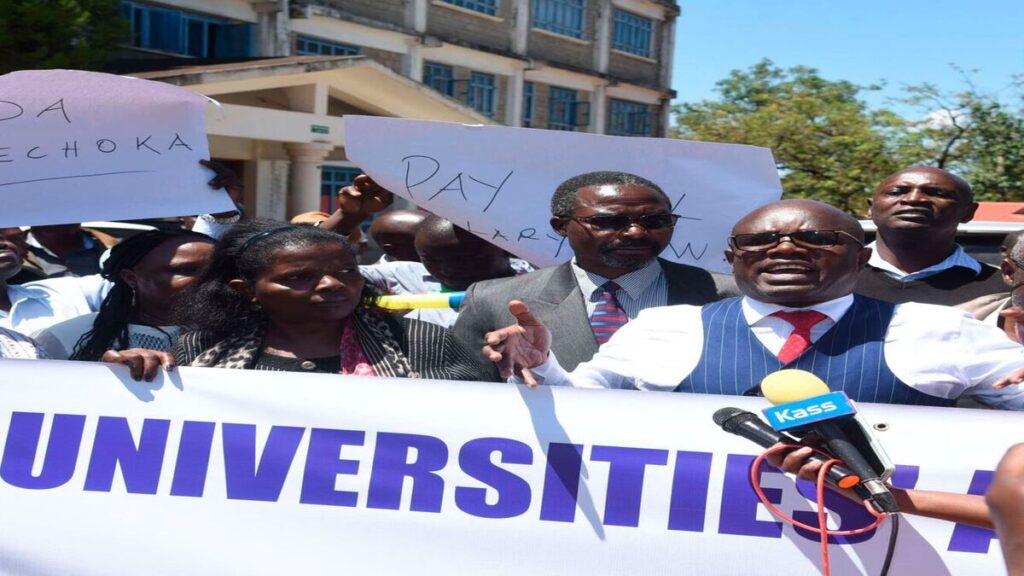Students in Kenyan public universities are grappling with severe mental distress amid ongoing strikes. The disruptions have thrown academic schedules into disarray across multiple institutions.
The Elimu Bora Working Group, representing student interests, has raised alarming concerns about the situation. They report that learners face mounting anxiety over their academic future.

University Academic Staff Union’s National Secretary General Dr Constantine Wasonga second (right), accompanied by the National Chairperson Dr Grace Nyongesa second (left), joins officials and other teaching members during their strike demonstrating in Eldoret City, Uasin Gishu County over pay on August 29, 2024.Courtesy photo
“Many students are uncertain about completing their coursework,” said a representative from the working group. The uncertainty extends to examination schedules, which remain unclear.
The crisis has particularly affected final-year students. These learners worry about delayed graduation dates due to the persistent interruptions.
Learning activities have come to a standstill in several public universities. The strike has forced many departments to suspend regular classes and academic programs.
Student leaders emphasize the psychological impact of the disruptions. They note that many learners are struggling to cope with the unexpected breaks in their education.
“The mental anguish among students is immense,” reported one student leader. The situation has left many feeling helpless and frustrated.
The working group has documented numerous cases of stress-related issues among students. These problems stem directly from the uncertainty surrounding their academic progress.
Financial implications have added another layer of concern for affected students. Many worry about additional costs if their academic terms are extended.
The crisis has prompted calls for immediate government intervention. Student representatives are urging authorities to address the underlying issues causing the strikes.
The Elimu Bora Working Group has been actively monitoring the situation. They continue to gather data on how the strikes affect student welfare.
Several universities have attempted to implement temporary measures. However, these solutions have proved inadequate in addressing the core problems.
The prolonged nature of the strikes has raised questions about the academic year’s integrity. Students fear they might lose valuable learning time that cannot be recovered.
Education experts warn of long-term consequences if the crisis persists. They point to potential impacts on graduation rates and career preparations.
The student leadership has proposed several solutions to the crisis. These include better dialogue between university administration and striking staff.
Parents have also expressed concern about their children’s academic future. Many worry about the financial implications of extended study periods.
The working group continues to advocate for student interests during this period. They emphasize the need for clear communication about academic schedules.
University administrators acknowledge the challenges faced by students. However, they cite various constraints in resolving the ongoing strikes.
The crisis has highlighted broader issues within Kenya’s higher education sector. These include funding challenges and staff welfare concerns.
Student leaders are calling for a comprehensive review of university operations. They believe this could help prevent similar disruptions in the future.
The mental health impact remains a primary concern for all stakeholders. Universities are being urged to provide counselling services during this period.
As the situation continues, students await concrete solutions. The hope is for a swift resolution that will allow normal learning to resume.
The Elimu Bora Working Group maintains its commitment to student welfare. They continue monitoring the situation and advocating for positive change.
The crisis serves as a wake-up call for Kenya’s education sector. It highlights the need for better crisis management in higher education institutions.